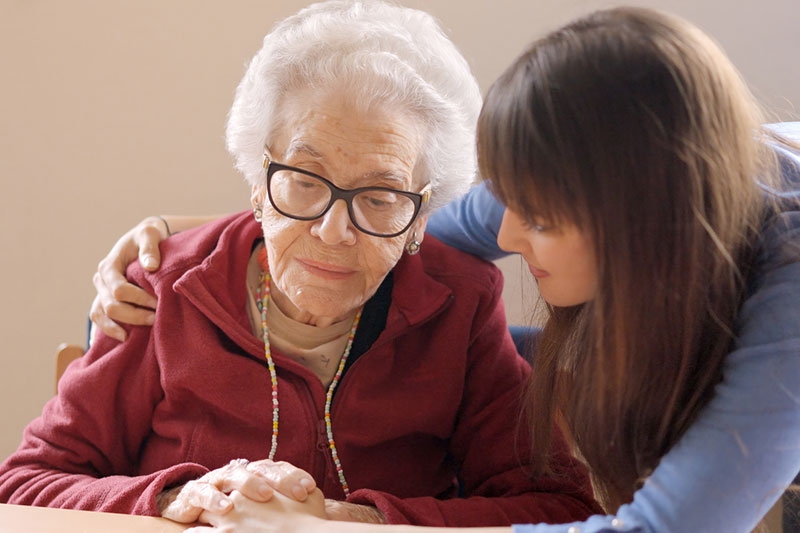
How to Deal with a Dementia Parent: 5 Tips for This Trying Time
Watching a parent or loved one decline with dementia can be difficult and sad. It can feel confusing and overwhelming, and you may feel uncertain about how to best support your loved one. If you’re not sure how to deal with a dementia parent, you’re not alone. Although the journey may be different for everyone, there are some general strategies, tips, and resources to help navigate this difficult time.
Understanding Dementia
First, it’s a good idea to understand what dementia is. According to the Alzheimer’s Association, Dementia is a general term that describes a decline in cognitive function such as the loss of memories, language, problem-solving skills, and other cognitive functions. These losses interfere with daily life. Alzheimer’s disease is a form of dementia and is the most common type, making up anywhere between 60%-80% of cases. Other types of dementia include:
- Vascular: Caused by reduced blood flow to the brain, often from a stroke or a series of mini-strokes. It primarily impacts problem-solving abilities and speed of thinking, differing from other types due to its direct connection to blood vessel issues.
- Frontotemporal: Characterized by degeneration of nerve cells in the frontal or temporal lobes of the brain. Affects personality, behavior, and language significantly. It typically begins at a younger age than other forms of dementia and primarily impacts behavior and language rather than memory.
- Lewy body: Abnormal deposits of the protein alpha-synuclein in the brain, known as Lewy bodies. Cognitive decline similar to Alzheimer’s with physical symptoms akin to Parkinson’s disease, such as tremors and muscle rigidity.
- Mixed dementia: Often involving more than one type of dementia, typically Alzheimer’s and vascular dementia, mixed dementia shows symptoms that reflect multiple underlying brain changes. It combines characteristics of several types of dementia simultaneously, which affects diagnosis, treatment, and progression.
Dementia is a progressive disease with the symptoms gradually worsening over time. Signs and symptoms of dementia can include short-term memory loss to leaving the house/neighborhood. With symptoms like these, it can be a difficult disease to watch a loved one go through and help them through.
5 Tips for Dealing with a Dementia Parent
1. Focus on Communication: Communication is key to both you and your family navigating dementia. A loved one with dementia may not have the same communication skills they once had. It may be difficult for them to understand complex language and long instructions, and they may forget words. This can be very frustrating for both them and you. To help your communication, keep these tips in mind for how to deal with a dementia parent:
-
- Validate their feelings. This is hard for everyone. Repeat back what they tell you rather than trying to argue or correct them.
- Speak slowly, using clear, short sentences.
- Make eye contact and use a positive, gentle tone of voice when communicating.
- Use nonverbal communication. Many people with dementia still understand mood, facial expressions, touch, and tone, even as their verbal skills decline. Focus on nonverbal communication, such as facial expressions and touch.
- Remove distractions while you are communicating so everyone can be focused.
2. Maintain Brain Health Care: There is no cure for dementia, but some brain health care can help slow down the progression of the disease. Studies show the below activities help slow the onset of dementia. Engage in these activities with your loved ones, and hire an experienced, passionate caregiver to do these tasks when you’re not around:
- Regular exercise
- Arts and crafts
- Games
3. Learn More: Dementia is a complex disease, and learning about it can provide you with insight, help you make informed decisions, and improve the care you provide. There are plenty of resources to begin your research. The Alzheimer’s Association, National Council on Aging, the National Institute on Aging, and your loved one’s medical provider are all great places to start.
4. Create a Safe and Familiar Environment: For someone with dementia, a predictable, familiar, friendly environment can help reduce anxieties. Create routines, remove clutter, and simplify living areas.
5. Seek Help When You Need It: Knowing how to deal with a dementia parent and actually doing it can be exhausting, and it’s okay to ask for help. Hiring a compassionate caregiver can be beneficial to you and your loved one with dementia. Some professionals are trained in dementia care and understand your loved one’s specific needs.
BONUS tip: Take care of yourself. The emotional impact of caring for a parent with dementia is undeniable. Family caregivers may feel a mix of emotions, including anger, sadness, guilt, and frustration. These are normal, but difficult to deal with. Don’t forget to make time for yourself—whether that’s spending time with friends and other family members, treating yourself to a “you” day, and even taking some of these responsibilities off your plate. Hiring a professional caregiver to ease the load can allow you to love your loved one.
You’re Not Alone. CareBuilders at Home is Here for You
“How to deal with a dementia parent” is a question countless families grapple with. CareBuilders at Home is your partner in dementia care. You don’t have to navigate this trying time alone. We offer a wide range of personalized in-home care to support older adults with dementia.
CareBuilders at Home offers a well-rounded Brain Health Care and Fitness program based on years of research and recommendations from the National Council on Aging. The program is a one-hour visit, three times a week, over a 25-week period. During that time, experienced and trained caregivers will guide and participate with dementia patients in:
- Physical activity: gentle chair yoga, resistance band workouts, walking, and other age-appropriate activities
- Activities to stimulate mental activity: Arts and crafts, games, journaling, and other activities designed to stimulate the brain.
If you need to talk to an expert on how to deal with a dementia parent, remember we’re a click away. Get the help you and your loved ones deserve with CareBuilders at Home. Contact us to learn more about our dementia care options.







